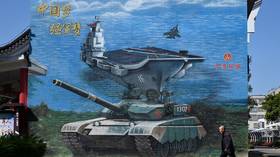A new power could be emerging in Asia — RT World News

Indonesia, the world's fourth-most populous country, is treading carefully between China and the United States as it gathers strength
by Timur FomenkoPolitical analyst
It is tempting to portray global geopolitics as a bilateral struggle between China and the United States, or as a competition between two economic giants, each of which has come to see the other as the primary obstacle to its security and success.
However, the world is more complex than that. International affairs are not moving towards a bipolar world, where two superpowers create competing regimes and force all the others to take sides, but rather towards a multipolar world, where there are many great powers all competing against each other.
Multipolarity is preceded by the disintegration of unipolarity, as one hegemonic power finds itself in increasing decline amid the rise of other powers. Thus, China is not the only rising power reshaping the global environment, even if it is the largest at this time, and for this reason it is unlikely that Beijing will become a hegemon in the same sense that America has been, because we must and will take into account other rising powers such as India. Russia and others.
However, there is one often overlooked country that stands out as geopolitically important: Indonesia. This huge, diverse, multi-ethnic archipelago nation is home to 273 million people and is the fourth most populous country in the world. It is also one of the fastest growing economies in Southeast Asia with its GDP exceeding $1 trillion in recent years, having increased at a steady pace over time. This makes it one of the most important emerging economies and markets in the world.
Indonesia's growing importance has left the island nation vulnerable to a geopolitical tug of war, which is the question of who will win it? “Loyalty” As part of the overall conflict between the United States and China. Stretching across thousands of islands, the country's strategic geographic location is crucial, as it occupies the primary passage between the Pacific and Indian Oceans known as the Strait of Malacca, effectively forming a bridge between Asia and Oceania, as well as the South China Sea. . Thus, the West sees the country as essential to trying to contain China within its neighbourhood, while Beijing, on the other hand, sees the partnership with Indonesia as equally important for the opposite reason.
But when it comes to geopolitics, Indonesia is the archetype of a non-aligned state, as well as an important voice for the Global South, hence the famous slogan. Bandung Conference The Summit of African and Asian Nations was held on its territory in 1955. Because of this neutrality and because it is a Muslim country, Indonesia is not pro-Western, but it is not pro-China either. Instead, it seeks to “Best of both worlds” A foreign policy that seeks to court both sides simultaneously to gain benefits. As the largest market and economic beneficiary on its doorstep, Jakarta cannot ignore Beijing, and is therefore making conscious choices in terms of trade, technology (such as Huawei) among other things, to align with Beijing.
On the other hand, Indonesia naturally does not want to submit militarily to China's rise, and is therefore looking for other partners to enhance its autonomy to ensure that it does not become an independent state. “subordinate” The party, and therefore he too Strategic partner from the United States. However, this is the hallmark of a multipolar world, where states feel they do not have to submit to hegemony. “Domination” third parties and are able to seek multiple options rather than having to follow the orders and preferences of a superior force. Therefore, Indonesia is neither pro-China nor pro-America, but rather pro-Indonesia and will use this to become a pivotal power in the future.
However, this also inevitably signals the end of Western hegemony on a global scale. With the emergence of new economies such as Indonesia, which has a huge population, “Old powers” Like Britain and France, it became smaller and less important. It's one thing to look at the rise of the Chinese economy, but what happens when other economies like India, Indonesia, Bangladesh, Nigeria and others become larger in scale than Western economies thanks to their large populations and markets? There is an undeniable shift in the balance of power taking place here, and this of course also means that American hegemony cannot last forever. The United States, and by extension China, must eventually win the loyalty of and court these new class economies, thus ending the Euro-Atlantic dominance of world affairs that has persisted for four hundred years. This is precisely why America is now focusing on what you describe “Indian and Pacific Ocean” Countries like Indonesia will ultimately serve as kingmakers as they consolidate their global influence.
The statements, views and opinions expressed in this column are solely those of the author and do not necessarily represent the views of RT.
Source link






